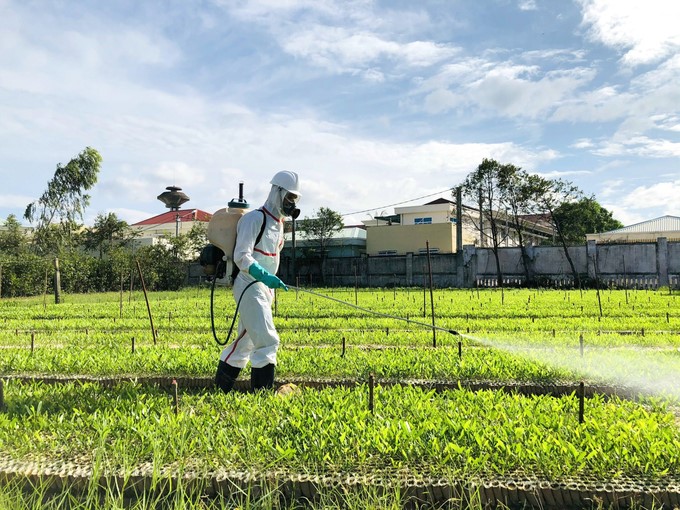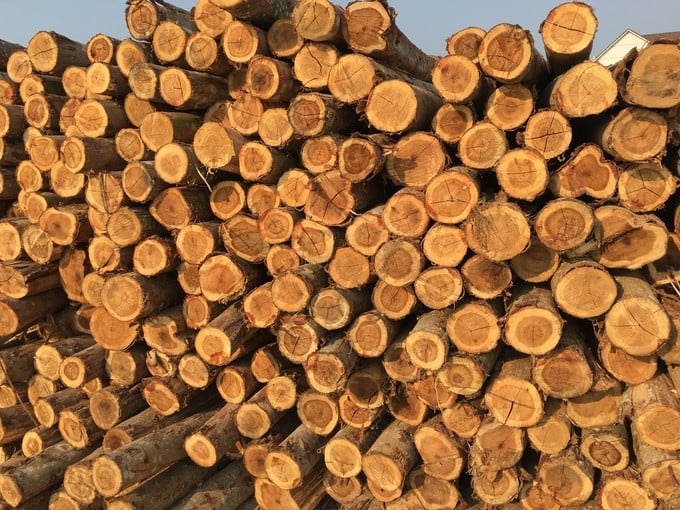November 19, 2025 | 14:13 GMT +7
November 19, 2025 | 14:13 GMT +7
Hotline: 0913.378.918
November 19, 2025 | 14:13 GMT +7
Hotline: 0913.378.918
After 5 years of implementing large timber forest plantations and businesses, up to now, Quy Nhon Forestry Company Limited (Quy Nhon city, Binh Dinh) has newly planted and converted 900 hectares of large timber forests. In particular, this unit's entire area of large timber forests has been certified with Sustainable Forest Management (FSC) by the GFA Organization (Germany) since 2020.
With forests initially planted at a density of 1,600-2,000 trees/ha, after 4-5 years, Quy Nhon Forestry Company Limited thinned them to convert them into large timber forests, leaving only 1,000-1,100 trees/ha. Then continue to invest in care to improve the quality of the forest after conversion, creating conditions for forest trees to grow and develop better.
According to Mr. Tran Nguyen Tu, Chairman of Quy Nhon Forestry Company Limited, trading in large timber trees has many benefits. First is reducing the number of times of exploitation and reforestation, and second is increasing the productivity of large timber forests. Average growth is over 25 m³/ha/year. The proportion of large timber (with a diameter of 13 cm or more) accounts for 60%, and small timber only accounts for 40%. Therefore, production efficiency is highly increased. Accordingly, workers' income is also improved.

Quy Nhon Forestry Company Limited produces hybrid acacia varieties using tissue culture technology to plant large timber forests. Photo: V.D.T.
"Business in large timber forests contributes to promoting the growth of forestry production value, improving added value and sustainable development, and increasing income for the company's production and business activities," Mr. Tran Nguyen Tu affirmed.
According to Mr. Tu's calculations, the output of large timber forests reaches up to 250 tons/ha, of which 150 tons with a diameter of 13 cm or more serve as raw wood sold to export wood processing factories at a price of 1.8 million VND/ton. The remaining 100 tons are small timber sold to chip factories at a price of 1.5 million VND/ton. Meanwhile, small timber forests only yield 140 tons/ha, of which only 14 tons of large timber sold for 1.8 million VND/ton, and the remaining 126 tons of small timber for wood chip processing sold at a price of only 1.5 million VND/ton.
"Thus, the total revenue of large timber forests is 425 million VND/ha, while the total revenue of small timber forests is only 220 million VND/ha. After deducting exploitation costs and other costs, such as investments in planting, caring for, and protecting forests and paying loan interest of 212.61 million VND, large timber forest growers still have a net profit of 212.39 million VND/ha. As for small wood forests, after deducting the total cost of 110.23 million VND, the net profit is only 110.27 million VND/ha. That's not to mention the raw wood from large timber forests with FSC certification having an added value of 20–30% compared to large timber without a certification," Mr. Tran Nguyen Tu calculated.
Currently, the demand for raw wood to serve the export wood processing industry in Binh Dinh is very large. Meanwhile, the source of wood exploited from natural forests is no longer available. The only source of domestic raw wood left is to rely on planted forest timber. However, planted forest timber now only meets less than 20% of the needs of Binh Dinh's export wood processing industry; more than 80% of the remaining needs depend entirely on imported raw wood.
The above fact is the motivation for Quy Nhon Forestry Company Limited to maintain the existing area of large timber forests and continue to expand the scale to 1,000 hectares in the coming time.
Determining that the seedlings planted in large timber forests are hybrid acacia varieties, Quy Nhon Forestry Company Limited has used the propagation method with tissue culture technology to serve afforestation for newly planted forest areas and replanted exploitation areas to achieve productivity, quality, and high economic value suitable for afforestation and large timber businesses.

Large timber trees served as raw wood for the export wood processing industry are currently priced at 1.8 million VND/ton. Photo: V.D.T.
To develop large timber forests, Quy Nhon Forestry Company Limited has invested in intensive farming, selecting forest tree varieties suitable for each soil, terrain, and climate region. In addition, the company applies the correct technical process to increase the productivity of planted forests and gradually transforms small timber forests into large timber forests. Develop a plan to monitor and evaluate the growth and development situation for each forest age level associated with a sustainable forest management plan and progress to granting a sustainable forest management certificate to improve economic efficiency.
The company also makes efforts to invest in infrastructure for areas developing concentrated large timber tree forest plantations, with special priority given to building a system of forest roads and fire barriers to facilitate transportation, planting, care, management, and protection, and apply mechanization to production. At the same time, build production linkage models from investment in afforestation to purchasing, processing, and consuming products.
“In the coming time, the company's key task is to develop planted forests for large timber businesses to improve production efficiency and increase added value in forestry production. At the same time, create a source of raw wood to supply the needs of the export wood processing industry in the province," shared Mr. Tran Nguyen Tu, Chairman of Quy Nhon Forestry Company Limited.
Translated by Thu Huyen

(VAN) Ca Mau has a sufficient foundation to become a strong regional aquaculture center, where production integrates the economy, the environment, and the lives of the people.

(VAN) SEIKI Group envisions itself as a pioneer in the ‘dual transformation’ of digital technology and green industry, standing alongside the Government and Vietnamese businesses in their pursuit of sustainable development.

(VAN) The VNGEONET network affirms Viet Nam's progress in mastering digital space, providing a precise positioning data platform to serve socioeconomic development.
/2025/11/14/3247-1-184556_35.jpg)
(VAN) Thai Nguyen is methodically implementing digital transformation in the livestock sector, laying the foundation for a modern, transparent, and sustainable agriculture.

(VAN) The year 2025 marks 80 years of development of the Agriculture and Environment sector, a proud journey with significant progress in production, integration and sustainable growth.

(VAN) De Heus continues to steadfastly pursue sustainable development, building linked value chains with farmers and businesses in Viet Nam.

(VAN) From the rich lands of Co Do (Can Tho), an enterprise is amplifying the value of the clean rice grain, a symbol of the vitality and pride of the Mekong Delta.